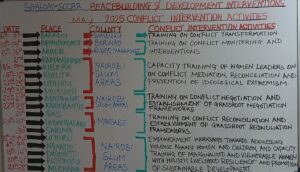By: Godfrey Okoth MA,
“The smell of death has refused to fade away. It has remained permanently etched in my nostrils It’s a nightmare that has refused to go away”. These were the words of a police constable who survived the November 2012 killing of 42 police officers by armed bandits in Baragoi’s Suguta Valley.
Described as one of the “disturbed and dangerous” regions within the country by Kenya’s Ministry of Interior (12th March 2023 Press release), Baragoi has been a troubled region that has for long been characterized by lethal interethnic killings, maiming and extensive destruction of property. Furthermore, the region has seen hatred and mistrust between the local ethnic groups and towards the government security agents. Many community members express a loss of hope in the capacity of the State to contain the ravaging insecurity that has persistently claimed precious lives of breadwinners and robbed people of their resources and other crucial needs of livelihood reselience.
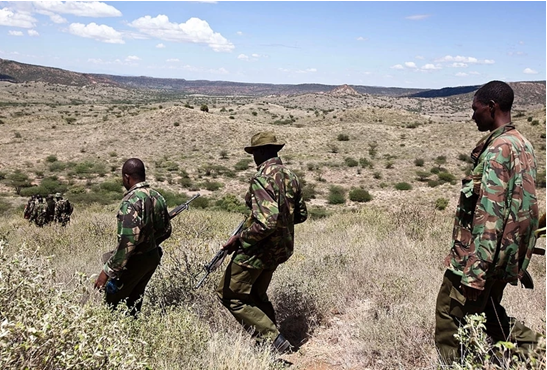
The never ending conflict between the Samburu and the Turkana in Baragoi has contributed to the entrenchment of negative memories of atrocious killings, permanent physical injuries, massive loss of property thus deep hatred and traumatizing fear of the ethnic other. It is commendable though how the government has made progress in quelling the escalation of manifest violence through the many security operations to flash out the bandits and disarm the communities. However, the harsh terrain and climatic conditions of the area coupled by the risks that herders are exposed to from both wild animals and enemy communities remain critical enablers of the motivation to stay armed at all times. Moreover, the long standing insecurity that the region has endured for ages continues to jeopardize efforts towards sustainable peace as both communities bear very minimal trust towards the intentions of the other as well as the government.
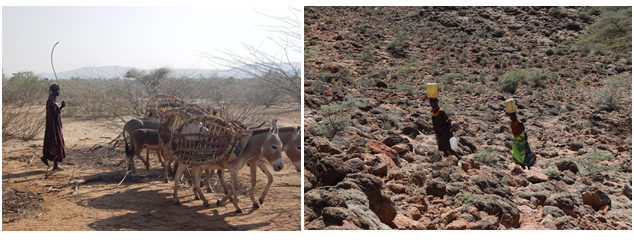
Such circumstances have often left stakeholders frustrated while wondering what more can be done in order to not only quell the physical manifest violence as the government has done but also to restore healthy and constructive relationship among local ethnic groups as well as between them and the government security apparatus. While pondering on this dilemma and having encountered the peacebuilding dividends that the neighboring communities of Tuum and Parkati are enjoying after over 10 years of engagement with Shalom-SCCRR, the community through the Parish of Baragoi realized the opportunity that the area could harness from Shalom’s transformative peacebuilding methodology and school/educational development interventions.
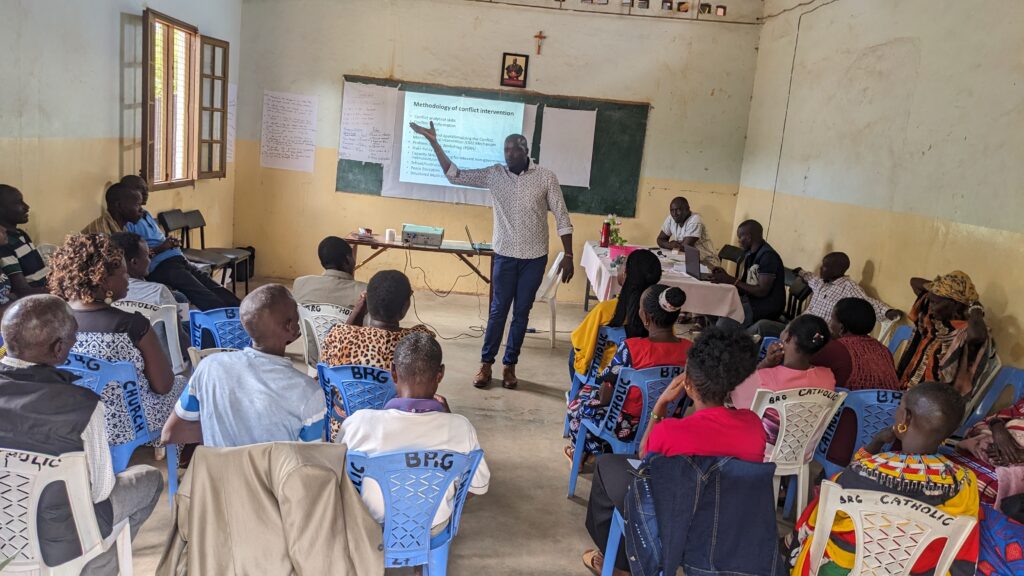
In response to the interest expressed by the community of Baragoi and their observable desire for long term peace, Shalom-SCCRR made a fact finding visit to the area for the first time to engage the leaders with the aim of establishing a long term locally based framework for peacebuilding. Shalom team comprised of Godfrey Okoth, MA (Senior Projects Officer), Kennedy Akoko, MA (Team leader), Vivian Adhiambo, MA Candidate (In-service Training) and Kennedy Oduor, Diploma (Transport Logistics). Characteristic to Shalom-SCCRR’s approach, the team carefully initiated the community entry by facilitating a listening and trust building session with key influential opinion shapers – women and men. The participants were given the opportunity to share their experiences of conflict in Baragoi, their fears with respect to the current conflict dynamics and their aspirations towards a brighter future of not only negative peace but eventually to positive peace.
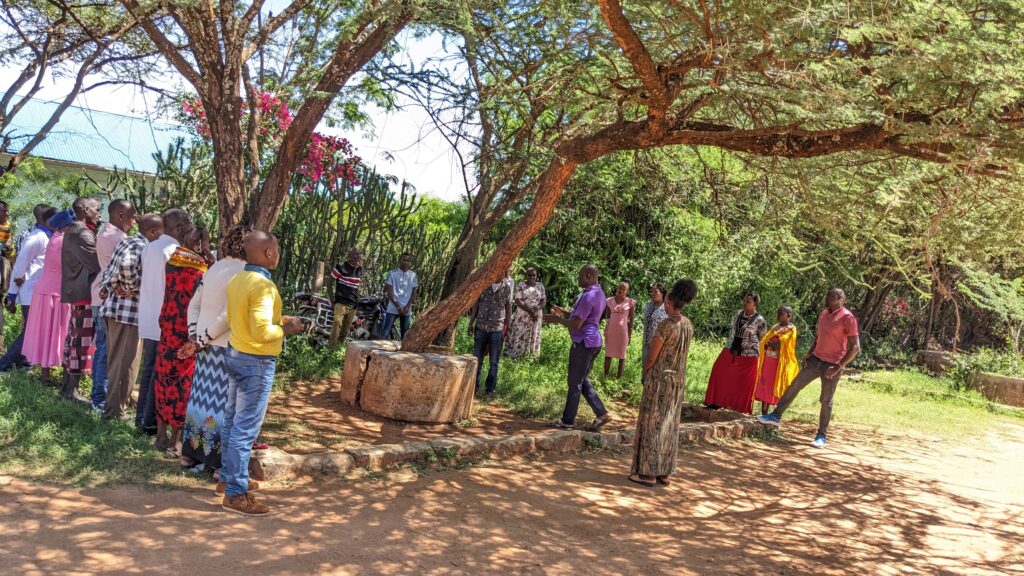
The community leadership thus welcomed Shalom in Baragoi to start the process of enhancing conflict resolution skills and peacebuilding techniques of community influential opinion shapers from both ethnic divides. In their appreciation remarks, the community leaders in attendance at the training unanimously noted the critical importance of transforming the behavior and entrenched cultural and structural enablers of conflict. Additionally, they noted that strengthening the institutional response capacities remains fundamental to the establishment of long term peace and bringing about mutual concern for the development and well-being of everyone regardless of their ethnic identity.
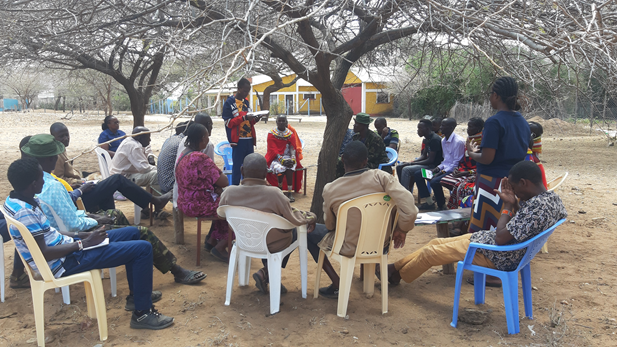
This observation supports the extent to which the community rely on Shalom-SCCRR’s approach to enable them initiate the healing of open emotional wounds that have time after time been made fresh by recurrent cases of physical and emotional violence. The community is eagerly looking forward to this project with great hope and Shalom-SCCRR project team are at their best and well-motivated to work with the local community towards the long awaited positive peace.
Author: Godfrey Okoth MA, Shalom-SCCRR Senior Projects Officer
Relevant Links
- Shalom-SCCRR (2023). 2022 Shalom-SCCRR Results and Achievements. https://shalomconflictcenter.org/2022-shalom-sccrr-results-and-achievements-2/
- Shalom-SCCRR. (2022). 2009-2021 Shalom-SCCRR Results and Achievements. https://shalomconflictcenter.org/2009-2021-shalom-sccrr-results-and-achievements/
- Shalom-SCCRR. (2023). Shalom-SCCRR 2022 Conflict Transformation and Peacebuilding Results & Achievements. https://shalomconflictcenter.org/2022-shalom-sccrr-conflict-transformation-peacebuilding-results-and-achievements/
- Shalom-SCCRR. (2023). 2022 Shalom-SCCRR School/ Educational Development Projects Results and Achievements. https://shalomconflictcenter.org/2022-shalom-sccrr-school-educational-development-projects-results-and-achievements/
- Prof. Wanakayi K. Omoka’s Understanding of the Philosophy and Work of Shalom-SCCRR Recollected; Augmented with 2022 Results by the Dept. of Monitoring, Evaluation, Research, and Learning (MERL). https://shalomconflictcenter.org/recalling-prof-wanakayi-k-omoka-phd-understanding-of-the-philosophy-and-work-of-shalom-sccrr-augmented-with-2022-shalom-sccrrs-achievements-and-results/
- Odhiambo, K. (2020). Briefing Paper No. 9: An Analysis of Turkana-Samburu Conflict. An Assessment of Inter-Communal Cohesion. https://shalomconflictcenter.org/briefing-paper-no-9/
- Shalom-SCCRR. (2016). Challenging the Narrative of Conflict in Baragoi, Samburu County. https://shalomconflictcenter.org/challenging-the-narrative-of-conflict-in-baragoi-samburu-county/
- Okoth, G. (2016). Samburu and Turkana Women Unite in Historic Mission to Sustain Peace in Samburu North. https://shalomconflictcenter.org/samburu-and-turkana-women-unite-in-historic-mission-to-sustain-peace-in-samburu-north/
- Moran, M. (2023). Ending conflict and promoting peace in Eastern Africa. https://www.ucanews.com/news/ending-conflict-and-promoting-peace-in-eastern-africa/101132
- Prof. Omoka. W. K and Devine, P. R. (2020). Human Rights are a Foundation of Shalom-SCCRR’s Conflict Resolution and Reconciliation Interventions. https://shalomconflictcenter.org/human-rights-are-a-foundation-of-shalom-sccrrs-conflict-resolution-and-reconciliation-interventions-2/
- Irish Minister Visits Shalom, Praises Work for Peace https://shalomconflictcenter.org/irish-minister-visits-shalom-praises-work-for-peace/
- EVIDENCE: Shalom’s Methodology leads to Conflict Prevention and Peacebuilding Progress. https://shalomconflictcenter.org/evidence-shaloms-methodology-leads-to-conflict-prevention-and-peacebuilding-progress/
- Radicalization and Extremism in Eastern Africa: Dynamics and Drivers. https://shalomconflictcenter.org/wp-content/uploads/2021/02/Radicalisation-and-Extremism-in-Eastern-Africa-Dynamics-and-Drivers.pdf
- Fr. Patrick Devine PhD, Lecture at the National Justice & Peace Network (NJPN) Conference 2022, UK https://shalomconflictcenter.org/fr-patrick-devine-phd-lecture-at-the-national-justice-peace-network-njpn-conference-2022-uk/
- Okoth, G. (2022). Shalom-SCCRR’s Data-Driven Peacebuilding Methodology: Progress in Mainstreaming Research as the basis for Communities’ Collective Action in Conflict Transformation and Peacebuilding. https://shalomconflictcenter.org/shalom-sccrrs-data-driven-peacebuilding-methodology/
- Odhiambo, K. (2022). A Future of Safety and Hope; Shalom-SCCRR providing Security Infrastructure Support to Chumvyere Primary School.https://shalomconflictcenter.org/a-future-of-safety-and-hope-shalom-sccrr-providing-security-infrastructure-support-to-chumvyere-primary-school/
- Shalom-SCCRR. (2022). Shalom Empowerment Center (SEC) Addressing Violence against Women and Children: Concept Document. https://shalomconflictcenter.org/eastern-africa-shalom-empowerment-center-sec-addressing-violence-against-women-and-children-concept-document/
- Akedi, J., Kibe, E., & Osiro, M. (2023). Shalom-SCCRR Peace Education in violent and deprived locations: Interventions within Schools in Kenya’s Urban Informal Settlements (Slums) of Kibera, Mathare, and Kariobangi. https://shalomconflictcenter.org/shalom-sccrr-peace-education-in-violent-and-deprived-locations-interventions-within-schools-in-kenyas-urban-informal-settlements-slums-of-kibera-mathare-and-kariobangi/
- Molumby G. (2022). Resolution of conflict requires hope and research. https://www.irishpost.com/news/resolution-of-conflict-requires-hope-and-research-238003
- Kibe, E. (2022). Shalom-SCCRR’s International Chairman, Rev. Dr. Patrick Devine addresses the Harvard Kennedy School, USA. https://shalomconflictcenter.org/shalom-sccrrs-international-chairman-rev-dr-patrick-devine-addresses-the-harvard-kennedy-school-usa/

